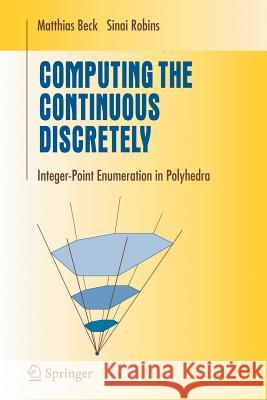Computing the Continuous Discretely: Integer-Point Enumeration in Polyhedra » książka
Computing the Continuous Discretely: Integer-Point Enumeration in Polyhedra
ISBN-13: 9781441921192 / Angielski / Miękka / 2010 / 227 str.
The world is continuous, but the mind is discrete. David Mumford We seek to bridge some critical gaps between various ?elds of mathematics by studying the interplay between the continuous volume and the discrete v- ume of polytopes. Examples of polytopes in three dimensions include crystals, boxes, tetrahedra, and any convex object whose faces are all ?at. It is amusing to see how many problems in combinatorics, number theory, and many other mathematical areas can be recast in the language of polytopes that exist in some Euclidean space. Conversely, the versatile structure of polytopes gives us number-theoretic and combinatorial information that ?ows naturally from their geometry. Fig. 0. 1. Continuous and discrete volume. The discrete volume of a body P can be described intuitively as the number of grid points that lie inside P, given a ?xed grid in Euclidean space. The continuous volume of P has the usual intuitive meaning of volume that we attach to everyday objects we see in the real world. VIII Preface Indeed, the di?erence between the two realizations of volume can be thought of in physical terms as follows. On the one hand, the quant- level grid imposed by the molecular structure of reality gives us a discrete notion of space and hence discrete volume. On the other hand, the N- tonian notion of continuous space gives us the continuous volume.











